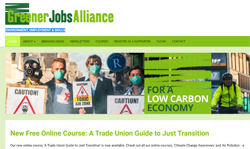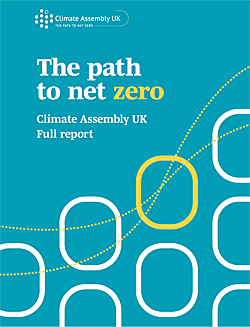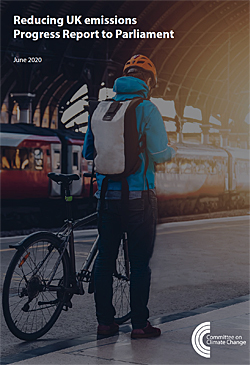 |
|
|
|
Friday 25th September 2020 marks a day of action highlighting the threat of Climate Change to the planet and life, including that of human beings, as well as those of wildlife and the natural environment which sustains it all. Several major reports on Climate Change and environmental issues urgently needing to be addressed; are available from this website’s E-Library, but the purpose of this news item is to highlight 3 major reports issued this year, and the work of the Trade Union backed Greener Jobs Alliance.
The editor is Graham Petersen, also the GJA Secretary, and is well known to the CWU and has a long standing working relationship with the Union. He is a former TUC tutor and course designer who created Safety Reps’ training courses. He was the head of the Trade Union Studies Centre at South Thames College before retirement from the post. The GJA has a close working relationship with the CWU Health, Safety & Environment Department and CWU Safety Reps. You can download the latest GJA Newsletter from the unionsafety E-Library by clicking on the cover photo to the left. Better still you can register for email updates by becoming a GJA supporter - click on the top right photo. The first of the 3 reports added to the E-Library dealing specifically with the issues around tackling Climate Change and the life-threatening effects of it upon human beings in particular is: Changing Markets Foundation ‘Talking Trash’ This report has 98 pages of facts and evidence against major multi-national big businesses, e.g. Coca-Cola, Pepsi, Nestle and Unileaver. It deals specifically with Plastic pollution. To quote the intro to the report:
Based on research and investigations in over 15 countries across five continents, it reveals how – behind the veil of nice-sounding initiatives and commitments – the industry has obstructed and undermined proven legislative solutions for decades. We have critically analysed voluntary commitments from the biggest plastic polluters, dissected the most prominent group initiatives (some of them championed by governments and NGOs) and revealed how companies across the plastic supply chain – from the oil industry to consumer brands and retailers – really act behind the scenes. Our case studies show that not only have voluntary initiatives failed to contain the plastics crisis, but also that companies have used these initiatives as a tactic to delay and derail progressive legislation – all while distracting consumers and governments with empty promises and false solutions.’ The second report is by: Climate Assembly UK has produced a report to the UK Government on Climate Change which contains details of specific recommendations on how the UK can attain it’s goal of being Carbon Neutral. The report entitled ‘The Path To Net Zero’ is from Climate Assembly UK, a body of 108 people put together by six House of Commons Select Committee Chairpersons and includes people from all walks of life. To quote from the report’s Forward from Committee Chairs: ‘The voice of Climate Assembly UK is important because it is unique: a body whose composition mirrors that of the UK population. People from all walks of life taking the time to inform themselves on complex issues, discussing the topics with experts and each other, and reaching conclusions.’
Education and information: there is a need for information and education for everyone – individuals, businesses, government and others – about climate change and the steps needed to tackle it. It is essential for buy-in to the changes that are needed. Fairness: as with most things in life, the solutions to climate change are neither easy nor free, but they need to be fair. Fair to people with jobs in different sectors. Fair to people with different incomes, travel preferences and housing arrangements. Fair to people who live in different parts of the UK. Freedom and choice: we believe it is important to maintain, wherever possible, freedom and choice for both individuals and local areas so that they can choose the solutions that work best for them. This should not be at the expense of taking the steps necessary to ensure a safe and healthy environment for future generations. We have outlined in this report where we believe an acceptable balance lies. Co-benefits: tackling climate change could bring with it many advantages. It could see benefits for local communities, high streets and local businesses. It could boost our economy and promote innovation, including in technology. And it could improve our health and reduce pollution. The UK should take advantage of these potential rewards. Nature: we need to protect and restore our natural environment, and our access to it. We strongly support measures that have a positive impact on biodiversity and wildlife, whilst also helping the UK move towards its net zero goal. The third report is entitled: Reducing UK Emissions - Progress Report to Parliament Clearly the title itself tells you what this report is about, and in discussing the issues concerned around toxic pollution from industry, it also disusses that which contributes to the declining air quality within our towns and cities. The forward to the report explains: This report provides important new advice to Government on framing a recovery from Covid-19 that both accelerates the transition to Net Zero and strengthens our resilience to the impacts of climate change, whilst driving new economic activity. It builds on the six key principles for a resilient recovery which we outlined in our letter to the Prime Minister in May. We are pleased to see these principles guiding the growing momentum for a green recovery. This report to Parliament includes our annual review of UK progress in reducing greenhouse gas emissions. The message is clear: action taken in this Parliament will define the pathway towards Net Zero and climate change resilience.
COVID-19 is a public health crisis; our recovery from it will reshape how we tackle the climate crisis. Choices in the coming months must steer a recovery that drives vital new economic activity, accelerates our transition to Net Zero and strengthens our resilience to the impacts of climate change. UK domestic climate ambition can be the basis for UK international leadership in 2021, in the Presidency of the delayed UN climate summit in Glasgow (COP26) and in the G7 Presidency. It is 12 months since Net Zero became law, requiring the UK to reduce net emissions of greenhouse gases to zero by 2050. Initial steps towards a net-zero policy package have been taken, but this was not the year of policy progress that the Committee called for in 2019. Net Zero has been adopted as a key goal of the Government and the Prime Minister is chairing a Cabinet Committee to deliver it. There were important new announcements on transport, buildings, industry, energy supply, agriculture and land use. But these steps do not yet measure The delay of COP26 to November 2021 provides a window to address this policy deficit and establish a credible internationally-leading position: • The Buildings and Heat Strategy, due later this year, must take low-carbon heating from a niche market in the UK to the dominant form of new heating installation by the early-2030s. It should be supported by a national effort to improve the energy efficiency of UK buildings along with ensuring their safety and comfort as the climate warms. • The Government's welcome new ambitions to change patterns of transport demand and decarbonise surface transport still require strong policies to deliver them, especially in the context of COVID-19 recovery and social distancing. • The goal to substantially expand supplies of low-carbon power must be accompanied by steps in the Energy White Paper to encourage a resilient and flexible energy system. • Enduring market mechanisms are needed to drive investment in a much wider set of lowcarbon industrial technologies and industrial sectors than the piecemeal schemes announced so far. • The unique opportunity to reform agricultural support and encourage transformational landuse change will be missed unless the Environment and Agriculture Bills are strengthened. They should be backed by a strategic mechanism to fund tree planting and natural carbon storage at a much larger scale while improving the productivity and resilience of our food supply, strengthening flood protection and protecting biodiversity. • UK leadership also depends on building resilience to climate change, a resilience which no UK sector has yet demonstrated for even a 2°C rise in global temperature. We will publish our updated assessment of the risks and a review of the UK's progress next June, by which time much better plans must be in place. The Cabinet Committee on Climate Change will be crucial to coordinating and prioritising crossdepartmental initiatives and will need to move to frequent, regular meetings. Success requires that net-zero emissions and improved climate resilience are integral to the COVID-19 recovery. Source: GJA / CWU / Committee On Climate Change / Climate Assembly UK / Changing Markets Foundation See also the E-Library fro a whole range of documentation on Climate Change, Air Pollution, and environmental matters here
|





 The executive summary clearly link s the need to ensure recovery from Covid-19 is integral to attaining the Net Zero ambitions made law of the UK:
The executive summary clearly link s the need to ensure recovery from Covid-19 is integral to attaining the Net Zero ambitions made law of the UK: